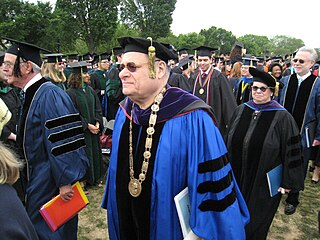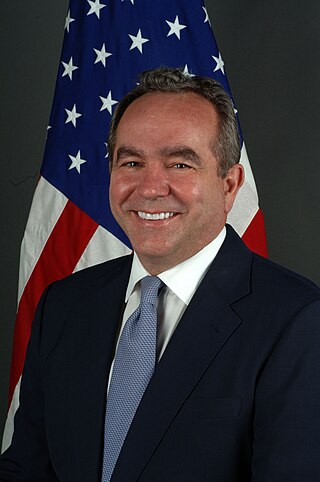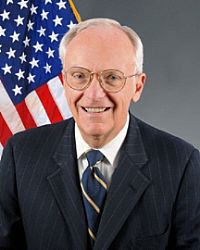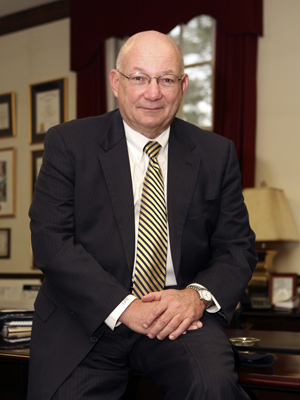Related Research Articles

The George Washington University is a private federally chartered research university in Washington, D.C. Chartered in 1821 by the United States Congress, GW is one of six universities in the United States with a congressional charter.

Baruch College is a public college in New York City. It is a constituent college of the City University of New York system. Named for financier and statesman Bernard M. Baruch, the college operates undergraduate and postgraduate programs through the Zicklin School of Business, the Weissman School of Arts and Sciences, and the Marxe School of Public and International Affairs.

The Maxwell School of Citizenship and Public Affairs is the professional public policy school of Syracuse University, a private research university in Syracuse, New York. The school is organized in 11 academic departments and 13 affiliated research centers and offers coursework in the fields of public administration, international relations, foreign policy, political Science, science and technology policy, social sciences, and economics through its undergraduate (BA) degrees, graduate Master of Public Affairs (MPA), Master of Arts (MA), and PhD degrees.

The Paul H. Nitze School of Advanced International Studies (SAIS) is a graduate school of Johns Hopkins University based in Washington, D.C. with campuses in Bologna, Italy and Nanjing, China.

Elon University is a private university in Elon, North Carolina. Founded in 1889 as Elon College, Elon is organized into six schools, most of which offer bachelor's degrees and several of which offer master's degrees or professional doctorate degrees.
The Association of Professional Schools of International Affairs (APSIA) is a non-profit educational organization of graduate schools of international affairs, with 40 members and 29 affiliates around the world.

Adam William Herbert, Jr. is an American retired academic administrator. He served as president of the University of North Florida from 1989 to 1998, as chancellor of the State University System of Florida from 1998 to 2001, and as president of Indiana University from 2003 to 2007. He was the first African-American to hold the latter two positions. He announced his retirement from Indiana University in 2007, and was succeeded by Michael McRobbie.

The School of International and Public Affairs (SIPA) is the international affairs and public policy school of Columbia University, a private Ivy League university located in Morningside Heights, Manhattan, New York City. It is consistently ranked one of the leading graduate schools for international relations in the world. SIPA offers Master of International Affairs (MIA) and Master of Public Administration (MPA) degrees in a range of fields, as well as the Executive MPA and Ph.D. program in Sustainable Development.

The Lyndon B. Johnson School of Public Affairs is a graduate school at the University of Texas at Austin that was founded in 1970 to offer training in public policy analysis and administration for students that are very interested in pursuing careers in government and public affairs-related areas of the private and nonprofit sectors. Degree programs include a Master of Public Affairs (MPAff), a mid-career MPAff sequence, 16 MPAff dual degree programs, a Master of Global Policy Studies (MGPS), eight MGPS dual degree programs, an Executive Master of Public Leadership, and a Ph.D. in public policy. The LBJ School is currently ranked 7th among public affairs programs in 2022 by U.S. News & World Report, up from 8th in 2021.

Stephen Joel Trachtenberg was the 15th President of the George Washington University, serving from 1988 to 2007. On August 1, 2007, he retired from the presidency and became GW's President Emeritus and University Professor of Public Service at the Trachtenberg School of Public Policy and Public Administration.

Walter Doyce Broadnax was an American academic administrator, educator, and university president. He was a Distinguished Professor of Public Administration at the Maxwell School of Citizenship and Public Affairs at Syracuse University, a role he held from 2008 until 2015. Prior to this appointment he served as the second president of Clark Atlanta University in Atlanta, Georgia, retiring after six years in July 2008.

Mitchel B. Wallerstein is an American educator, philanthropist, policy expert, and former official of the federal government of the United States. He is the President Emeritus of Baruch College of the City University of New York and is currently appointed as a University Professor, teaching courses on international security and public policy. In 2021, he was also appointed as a Non-resident Senior Fellow on U.S. Foreign Policy at the Chicago Council on Global Affairs. From 2003 to 2010, Wallerstein served as dean of the Maxwell School of Citizenship and Public Affairs at Syracuse University, ranked as the nation's leading school of public and international affairs. Throughout his career, he has led important roles within the US government, NATO, and in top universities and think-tanks.

The Schar School of Policy and Government - SSPG, is the public policy school of George Mason University, a public research university in the Commonwealth of Virginia near Washington, D.C. Established as Northern Virginia's first public policy school with locations in Arlington and Fairfax County, the school's political science curriculum has a professional education and applied emphasis on public administration and national security at both the undergraduate and graduate levels, in addition to a traditional liberal arts education, while also maintaining an active role within all five major subfields of political science known as political philosophy, political methodology, comparative politics, international relations, public policy and public administration.

Kurt Michael Campbell,, is an American diplomat and businessman, who is currently serving as the National Security Council Coordinator for the Indo-Pacific. In this capacity, Campbell has been referred to as the "Asia co-ordinator" or "Asia Tsar" of the President Joe Biden's administration.

Gustavo "Gus" Adolfo Mellander is a leader in the field of university and college administration in the United States. He served as dean of academic affairs and interim chancellor at Inter American University of Puerto Rico, 1966–69, dean of York College, 1969–72, president of Passaic College in New Jersey from 1975 to 1985, president of Mission College, 1985, chancellor of the West Valley-Mission College District in California from 1985 to 1992, and subsequently as Dean of a Graduate School at George Mason University. In 1981 he was appointed by the governor of New Jersey to the State Board of Education. Since 2000 he has been President of Academic Resources, an academic research company.
Mark N. Katz is a professor of government and politics at George Mason University Schar School of Policy and Government in Fairfax, Virginia, United States, and a nonresident senior fellow at the Atlantic Council in Washington, DC. He researches and teaches classes about Russian politics and foreign policy, revolution, and the "War on Terror."

Douglas Alan Brook is visiting professor of public policy in the Sanford School of Public Policy at Duke University. He was United States Assistant Secretary of the Army from 1990 to 1992 and Assistant Secretary of the Navy from 2007 to 2009.

Luther F. "Fred" Carter is an American university president and a former senior governmental official. He is the 4th President of Francis Marion University in Florence, South Carolina. He assumed office in 1999.

The Michael V. Hayden Center for Intelligence, Policy, and International Security is a think tank in Arlington, Virginia focused on the intelligence community including topics related to intelligence studies education, intelligence analysis techniques, and the operations of intelligence agencies, as well as public policy and international relations related to national security, international security, and foreign policy through shared experiences of senior intelligence service leaders, military officers, elected officials, journalists, academics, and other civilian scholars. It is housed within the Schar School of Policy and Government but also cooperates with the Antonin Scalia Law School’s National Security Institute in conducting research around legal issues pertaining to national security; both of which are affiliated with George Mason University.
Robert L. Deitz is an American lawyer and former intelligence officer who served as senior counsel to the Director of the Central Intelligence Agency and General Counsel of the National Security Agency during the directorships of Michael Hayden. He is a professor of public policy at George Mason University's Schar School of Policy and Government.
References
- 1 2 "A. Lee Fritschler '59 – Still in the classroom". Union College News Archives. March 1, 1995. Retrieved 13 January 2023.
- ↑ DiDomenico, Tammy (1 January 1999). "Alumni Academic Leaders". Syracuse University Magazine . Vol. 16, no. 2. pp. 46–47. Retrieved 13 January 2023.
- ↑ Fritschler, A. Lee (1969). Smoking and Politics: Policymaking and the Federal Bureaucracy. Appleton-Century-Crofts. ISBN 978-0-390-33500-5 . Retrieved 13 January 2023.
- ↑ Kimball, William Clayton (1970). "Review of Smoking and Politics: Policymaking in the Federal Bureaucracy". Brigham Young University Studies . 10 (4): 493–496. ISSN 0007-0106. JSTOR 43042441 . Retrieved 13 January 2023.
- ↑ Collection: Office of Staff Secretary; Series: Presidential Files; Folder: 3/1/79; Container 10 (PDF) (Report). March 1, 1979. pp. 43–47. Retrieved 13 January 2023.
- ↑ "Nomination of A. Lee Fritschler". United States Senate Committee on Governmental Affairs . U.S. Government Printing Office. July 25, 1979. Retrieved 13 January 2023.
Hearing Before the Committee on Governmental Affairs, United States Senate, Ninety-sixth Congress, First Session on Nomination of A. Lee Fritschler, of the District of Columbia, to be a Commissioner of the Postal Rate Commission
- ↑ Barringer, Felicity (2 November 1981). "The Sticky Story of the 20-Cent Stamp". Washington Post . Retrieved 13 January 2023.
- 1 2 "Lee Fritschler Returns to Brookings As Director of Public Policy Education". Brookings Institution (Press release). January 2, 2002. Retrieved 13 January 2023.
- ↑ McDonald, Kim (2 July 1999). "Dickinson College Head Nominated to Key Education Post". The Chronicle of Higher Education . Retrieved 13 January 2023.(subscription required)
- ↑ Burd, Stephen (14 January 2000). "The New Federal Point Man for Higher Education: A. Lee Fritschler". The Chronicle of Higher Education . Retrieved 13 January 2023.(subscription required)
- ↑ "Washington Briefs: Education Department's Revolving Door Continues". Diverse: Issues In Higher Education . 22 December 1999. Retrieved 13 January 2023.
- ↑ "A Washington Roundup: Fritschler Sworn In as Assistant Secretary (News in Brief)". Education Week . 1 December 1999. Retrieved 13 January 2023.
- ↑ "Distinguished Speaker Series: A. Lee Fritschler, 2014 Woodrow Wilson Visiting Fellow". Scripps College . Claremont, California. 20 September 2014. Retrieved 13 January 2023.
- ↑ "A. Lee Fritschler". Schar School of Policy and Government . Retrieved 13 January 2023.
- ↑ "Quality Assurance: Register of Auditors: Lee FRITSCHLER". www.ugc.edu.hk. Retrieved 13 January 2023.
- 1 2 A. Lee Fritschler | WorldCat.org. Marquis Who's Who . Retrieved 13 January 2023– via WorldCat.
- ↑ Rowe, W. Glenn; Guerrero, Laura (4 April 2012). "Dickinson College: Inspiration for a Leadership Story". Cases in Leadership: Leadership: What Is It?. SAGE. pp. 38–39. ISBN 978-1-4522-3497-7. Archived from the original on 14 January 2023. Retrieved 14 January 2023.
{{cite book}}: CS1 maint: bot: original URL status unknown (link) - 1 2 3 "A. Lee Fritschler (1937- )". archives.dickinson.edu. Dickinson College . Retrieved 13 January 2023.
- ↑ "Candidate Biography: A. Lee Fritschler, Public Policy, George Mason University" (PDF). American Association of University Professors .
- ↑ "NAPA: A. Lee Fritschler MEMBER SINCE: 1978". National Academy of Public Administration . Retrieved 13 January 2023.
- ↑ "List of Presidents". www.aspanet.org. American Society for Public Administration . Retrieved 13 January 2023.